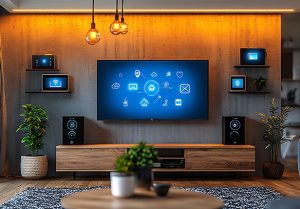Many times, seen as a fun addition to a property, home theaters provide a movie experience without leaving the house. Beyond enjoyment, though, could a home theater really raise the value of your house? Many homeowners question whether adding a dedicated movie room would increase the appeal of their house to purchasers or just provide a personal touch without payback. The response relies on several elements, including the degree of the space design, market demand, and setup quality. In this blog, we will discuss how a home theater might affect property value, what qualities are most important, and whether it is a reasonable investment. This guide will help you determine whether installing one is appropriate for your house if you are thinking about doing so.
How a Home Theater Adds Property Value
For purchasers, particularly those who appreciate entertainment, a well-designed home theater can be quite tempting. Though it might not be a need like a kitchen or bathroom, it nonetheless helps your house to be generally marketable. A home theater is seen by many buyers as a symbol of modern living; hence, your house will appeal more than those without one.
The degree of quality of the installation determines the value it brings. Far more appealing than a basic media arrangement in a living room is a specialized theater room with outstanding acoustics, cozy seating, and high-quality images. Those who give entertainment top priority when purchasing a house are generally ready to spend more for one that already features a ready-to-use theater, therefore sparing them the work involved in building one.
The Importance of Location and Market Demand
Not every home theater boosts property value in proportionate measure. The degree of purchasers’ appreciation of this trait depends significantly on the location. A home theater is anticipated rather than seen as an additional in luxury neighborhoods or places where high-end homes abound. Conversely, in places where purchasers give practicality top priority, this function may not be as appealing.
One also must take the target market into account. Families with children or young professionals could find a home theater more tempting than those who give outside space or a home office top priority. Add one of the comparable homes in your neighborhood featuring theaters to keep your property competitive. The return on investment may be smaller, though, in economies where consumers value utility above entertainment.
Choosing the Right Equipment for Better Appearance
The value of a home theater relies on the caliber of the equipment put within. One can make a big difference with surround sound systems, high-density projectors, and smart lighting. A well-equipped room with modern technology will have more impact than a simple arrangement, including average-quality speakers and a modest screen.
Important elements raising value are:
- Either a 4K or 8K projector for clear images.
- Dolby Atmos or equivalent technologies.
- Acoustic paneling to improve sound quality.
- Smart lighting with dimmable settings.
- Comfortable chairs with recliners or tiered layout.
Not only does installing premium components make the area appealing, but it also guarantees that prospective purchasers view it as a real investment rather than merely a luxury.
Designing the Space for Maximum Impact
The design of a home theater influences not only its possible growth of house value but also its usefulness. Ideally, a dedicated room will enable correct acoustics and lighting management. Although a spare room or basement may be suitable, soundproofing is something else you should give great thought.
Factors enhancing the attractiveness and pleasure of a home theater consist in:
- Dark wall colors to lower glare.
- Thick carpeting or rugs for improved sound absorption.
- Built-in media and accessory storage.
- Tiered seats for a better view.
- Appropriate airflow to prevent overheating of equipment.
The experience can be diminished in a badly planned environment with distracting light reflections or incorrect speaker placement. A well-considered design helps the space to seem more valuable and professional.
The Cost vs. Return on Investment
Like any home renovation, installing a home theater is an investment; hence, it is crucial to balance the expenses with the possible return. The quality of the equipment and room alterations determines the cost of establishing a home theater. While a high-end system with premium features may reach $50,000 or more, a basic configuration can be a few thousand dollars.
The state of the housing market and buyer demand determines the return on invested money. While some real estate professionals advise that a well-integrated home theater can raise the value of a house by about 5-10%, others warn that the return is not always assured. A home theater can nonetheless get greater interest from buyers, therefore accelerating the selling of a house even if it does not greatly raise resale value.
Should You Build a Home Theater?
Think through your own enjoyment as well as possible resale value before deciding on a home theater. Whether or not it affects resale price, if you and your family enjoy movies, sports, or games, it might be a great addition. Research your local real estate market to discover if buyers in your area find it enticing if you are installing it just for resale needs.
A multi-purpose media room might be an excellent substitute for anyone wishing to add value without a whole theater configuration. Still versatile for other purposes, a well-equipped living room with high-quality sound and a big screen may provide a fantastic entertainment experience.
Conclusion
One excellent addition that improves your living experience and might increase the value of your house is a home theater. Location, market demand, and the quality of the setup all affect whether resale value rises. Although it might not always yield a good return on investment, it will help a house appeal to the correct purchasers. If you are considering installing one, concentrate on excellent components and clever design to maximize your expenditure.


